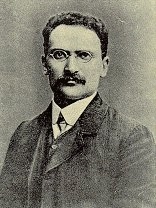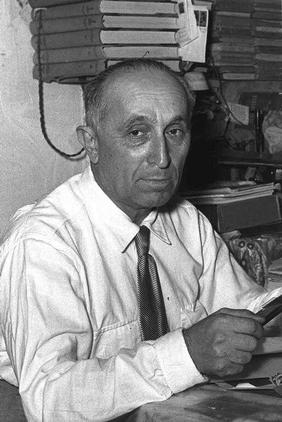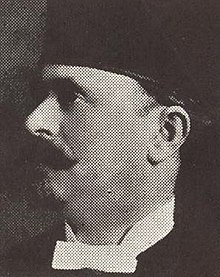
from Zolotonosha
Ber Borokhov
Ber Borokhov spent his formative years in Poltava, one-hundred miles to the west of Zolotonosha, his birth place. His parents' interest in education and Zionism would have a profound influence on the central themes of his life.
By Borokhov's early adult years he had joined the Russian Social Democratic Labour Party (in 1903 this party split into the Menshiviks and the Bolsheviks), but was expelled when, in 1901, he established the Zionist Socialist Workers Union.
This latter party advocated the establishment of an autonomous Jewish state outside of Palestine, supporting the Uganda Plan, which proposed the founding of a Jewish state in East Africa. The Zionist-Socialists also advocated the use of terrorism in the struggle against the Russian government, and was intimately involved in the 1905 revolution. See Zionist Socialist Workers Party and Poale Zion.
Borokhov played a role in the creation of Poale Zion (Workers of Zion), a Marxist-Zionist movement amalgamating Zionism and Marxism, an apparently "unnatural" combination since Zionism is a nationalistic ideology that also encourages the advancement of an individual's interests, whereas socialism is a universalist ideology.
Borokhov was able to rationalize, in his essay The National Question and the Class Struggle, Jewish Nationalism in terms of Marxist class struggle. See Borokhov Archive to read his essays.

Ber Borochov
Poale Zion was involved in the construction of Jewish agricultural colonies in the Crimea and in Ukraine, as well as the founding of a Jewish Republic in Biro-Bidshan. Mapaiand Mapam, Israeli political parties, evolved from Poale Zion.
Borokhov was an authority on the Yiddish Language and is regarded as the founder of Yiddish Studies. Contrary to most Zionists, who believed that Yiddish was an aberration of the Diaspora that must be replaced with Hebrew as the language of a resurrected Israel, Borokhov's choice for such a national language was Yiddish. Read the Yivo article on Borokhov.
Also of interest is Borokhov's essay Eretz Yisrael in our Program and Tactics and a Wikipedia article on Borokhov.
Isaac Boleslavsky
Born in Zolotonosha in 1919, Isaac Boleslavsky's skill in chess manifested itself at an early age. Self-taught at age nine, Boleslavsky became the 1933 school champion of Dnipropetrovsk. He won third prize in the 1936 USSR All-Union Junior championship, followed by the Ukrainian and Ukraine SSR championships. While Isaac Boleslavsky was accumulating chess championships, he was studying philology, earning a degree in that subject at Sverdlovsk University.
Boleslavsky acquired a number of other championships during the 1940's; was awarded the title of Grandmaster in 1945; and continued to win chess matches during the Cold War period, ending his competitive career in 1971.
Boleslavsky trained Soviet chess players and was a highly regarded chess analyst and writer. He developed theory on chess opennings and is most well-known for his Boleslavsky Variation of the Sicilian Defense. His most famous games can be found at Chess Matches www.chessgames.com/perl/chessplayer?pid=45134
Boleslavsky passed away in Minsk in February 1977 as a result of a fall caused by slipping on an icy sidewalk; a fractured hip developed an infection. Also see the Wikipedia article on Isaac Boleslavsky.
Alexander Zarchin
Born in 1897 Zolotonosha, Alexander Zarchin graduated from the Leningrad Technical Institute with a degree in Industrial Chemistry. Listening to a lecture about Arctic exploration, Zarchin was inspired to do research into the desalination of seawater when the explorer stated that melted ice was the source of his drinking water.
Zarchin did his research at the Lenigrad Technical Institute with the support of the Soviet Army and was able to develop an efficient desalination method. Despite Zarchin's contribution to his country, his Zionist leanings earned him five years in a Siberian gulag (apparently for using Hebrew letters in naming a process that he developed using magnesium in the production of certain metals); Zarchin continued his research during his Siberian interlude, where he developed a method of extracting petroleum from bitumen.

Alexander Zarchin
After serving in the Russian Army during World War II, Zarchin became a Lecturer at the Technical Institute of Tashkent.
When The War ended, Zarchin made his way to Israel where he adapted his research to Israel's environmental conditions. Based on Zarchin's desalination ideas, Israel's Ministry of Development appropriated funds for the construction of a pilot plant in Eilat. This process is based on the physical effect that freezing seawater results in the formation of ice crystals of pure water. This process is energy-efficient, using about fourteen percent of the energy used to boil water. However, the pilot plant was closed after a few years and replaced by a thermal distillation plant.
Abe Elenkrig
Abraham "Abe" Elenkrig (אברהם עלענקריג b. 1878 – d. 1965) Elenkrig was born in Zolotonosha, and was an American klezmer bandleader, Cornet player, barber and recording artist of the early twentieth century. He was among the earliest bandleaders to record klezmer music in the United States, making a series of discs for Victor Recording Company and Columbia Records from 1913-15.[1][2]
There is a wikipedia page created by Daniel Carkner devoted to his life at: https://en.wikipedia.org/wiki/Abe_Elenkrig
Abe Elenkrig Music - submitted by Arthur Zimmerman
This is link to the Discography of American Historical Records site which is hosted by Univ of California Santa Barbara. One of the editors is Sam Brylawski who was head of the recorded sound division at the Library of Congress. There was the Association of Concert Bands convention in Orlando the latter part of May 2023. The website has audio of many of the recordings.
https://adp.library.ucsb.edu/index.php/mastertalent/detail/107503/Elenkrigs_Orchestra
The symbol in the right column indicates if audio is available. To see details about the recording and hear it, click on the matrix number in the left column. Some may have been reissued on CD. The original 78s are relatively hard to find. Art has turned up hundreds of Yiddish 78s over the years, mostly vocals, but also some klezmer instrumentals. Art has never person
ally come across any by Elenkrig, although a friend of his has some.
Meyer Kanewsky
There is a wikipedia page created by Daniel Carkner devoted to his life at:
https://en.wikipedia.org/wiki/Meyer_Kanewsky

Last updated February 2021
Copyright ©2013 Janette Silverman and
©2014 and 2015 Gary Pokrassa